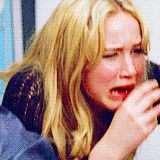Before I start perhaps it is appropriate to define what I mean by “progressive”. When I use the word progressive I mean it in both senses of the word, meaning, in the first instance, to develop and, in the second, to aid social reform. Thus whilst I admit that both series’ are similar and belong to the same dystopian YA thriller genres, I believe that The Divergent Series develops the YA fiction genre further than The Hunger Games and that it’s ideology is far more liberal than The Hunger Games.

There are definite spoilers ahead. You have been warned.
- The gay couple in Allegiant.
I really had to start with my biggest surprise throughout reading the books with the fact that Veronica Roth included not only a gay person, but a happy gay couple who – while they were minor background characters – were still portrayed as integral parts of the story. It was also not important to the story that they were gay – they just were gay. Wonderful, wonderful stuff. Contrary to this there is never seen to be any inclusion of any LGBT persons in the Hunger Games, despite what fan theorists may try to have us believe… - Where’s the love triangle?
Let’s hear a cheer for the missing triangle in Divergent! Not only is there no romantic conflict, but a happy, healthy, and loving relationship is developed and maintained throughout the three novels! That’s not to say they are always happy, but Tris and Tobias do trust, love, and support one another despite the various other conflicts in their lives.

As much as I love Katniss and Peeta we see the continued trope of “the love triangle” used to build suspense regarding Katniss’ “happy ending” and the problematic “friendzone” which both Peeta and Gale find themselves in at one point or another, demanding things of Katniss rather than allowing her to be happy and make choices for herself. - Tris dies!

This point physically pains me to write because Tris dying is one of the most traumatic fictional events I have ever encountered. Not only did Veronica Roth defy fanservice and make YA history by killing off the main character she also reminded us of the painful truth that not everyone gets a happy ending, no matter how much you might want them to have it. The Hunger Games also did this extremely well with Prim’s death and I have to say Prim’s death was one of my highlights of the series, however, it’s conservative ending involving marriage and two children really dulled this down for me. - Allegiant’s POV swap.
Okay this is definitely a controversial one. As a writer myself I have doubts about how necessary and/or appropriate it was to split Allegiant into two different points of view: Tris and Tobias. Of course it is useful in that Tobias is able to continue the story once Tris is dead and it is also a cool development within this series. We have seen multiple uses of POV swap in previous YA fiction (such as Jacob/Bella in Eclipse), however this alternating style really pushes the boundaries of what we expect from YA literature and reminds us that there is room for innovation and creativity, even if not all of us agree it was particularly effective. - The destruction of the good vs. evil rhetoric.
Throughout children’s and young adult literature (most notably in the fantasy or dystopia genres) we find a narrative constantly being constructed of the good vs. the evil, most clearly depicted in fairy tales but also in literature such as Harry Potter, The Mortal Instruments, The Chronicles of Narnia, and most definitely within The Hunger Games.
There is a clear divide between President Snow and The Capitol, and the outlying districts. There is a great reason for this which Suzanne Collins demonstrates effortlessly, which is the divide between the rich and the poor which reflects our own societies class divide. However, it still continues this tired rhetoric of people being classified as good or bad with hardly any middle ground. Arguably Katniss is seen as somewhat morally deviant, as is Gale after his accidental killing of Prim, but even with these instances we are rather clear that Prim and Rue are seen as innocent victims of the Capitol and characters such as President Snow and Romulus Thread are seen as evil people who must be eliminated and eventually are.
Contrary to this just the structure of the Divergent world being split into five factions helps to shake up the good vs. bad rhetoric instilled upon YA thrillers. The only victims of this five faction system appear to be the factionless who may be viewed sympathetically, but instead actually have their own power and agency to rise up and rebel, causing death and destruction. Then there is Erudite who are classed as the villains for much of the series and do practice mind control and cause a lot of death, however, their notions that Abnegation should not be allowed to rule simple because that is the way it has always been shows sparks of liberalism and defy traditionalistic views of governing. Their defiance is also rooted in the suspicions that Abnegations aren’t all selfless and compassionate, between Marcus Eaton is an abusive piece of shit – and they are right about that. Despite this fact, however, Tris still works with Marcus knowing he abused her partner and he proves to be a useful character to the plot, again showing the complexities of morality. Evelyn, Marcus’ ex-wife and victim of his abuses also, can also be viewed as a sympathetic character having faked her own death to get away from the abuse it was so horrific, however, she left her son behind and rallies the factionless to uprise causing much destruction and mayhem.
In The Hunger Games Katniss strives in the first arena to not be responsible for any deaths whatsoever and (to my knowledge at least) she succeeds mostly except to revenge Rue’s death and sets up an unrealistic standard of heroism for our readers. In contrast to this, however, Tris’ situation is much more complex as she kills one of her friends whilst he is under mind control serum. She admits that in that moment it was kill or be killed and she opted to save herself. Her survival instinct matching much of what any normal human being may have felt in that situation and she becomes a symbol of humanity, flawed, selfish, but redeemable and forgivable. - The recurring message of self-care and self-compassion.

Throughout the series Tris struggles to reconcile the events that have brought her to where she is. She struggles with the lives she has taken and the lives that have been taken from her a lot throughout the series, even leading to her being unable to hold or shoot a gun during Insurgent. (Which of course the film completely skipped, bastards.) Katniss struggles similarly, but does not attempt to help herself, she merely pushes through and proves to be the strong female character we expected her to be, almost managing to forget about those traumatic memories and emotions. In Tris’ case she is constantly seen to discuss her issues with others, including telling Tobias about her parent’s death, and ultimately in Allegiant she manages to come to a closure with her journey of self-compassion as displayed below.Can I be forgiven for all I’ve done to get here?
I don’t know. I don’t know.
Please.
(Divergent, page 476)Can I be forgiven for all I’ve done to get here?
I want to be.
I can.
I believe it. (Allegiant, page 476)
If you have an alternate opinion please comment below! I would love to hear it.
(P.s. can you tell Allegiant is my favourite book?)
